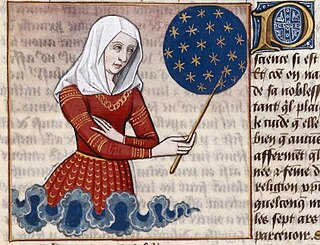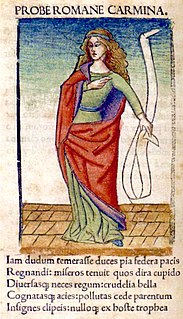Faltonius Pinianus (c. 235 aft. 286) was a Proconsul of Asia in 286 or 305.
He was the son of Faltonius Restitutianus.
He married and had issue:

Anastasius I Dicorus was Eastern Roman emperor from 491 to 518. He made his career as a government administrator. He came to the throne at the age of 61 after being chosen by the wife of his predecessor, Zeno. His religious tendencies caused tensions throughout his reign.

Gordian I was Roman Emperor for 21 days with his son Gordian II in 238, the Year of the Six Emperors. Caught up in a rebellion against the Emperor Maximinus Thrax, he was defeated by forces loyal to Maximinus, and he committed suicide after the death of his son.
Probus may refer to:

Faltonia Betitia Proba was a Latin Roman Christian poet, perhaps the earliest female Christian poet whose work survives. A member of one of the most influential aristocratic families, she composed the Cento Vergilianus de laudibus Christi, a cento composed with verses by Virgil re-ordered to form an epic poem centred on the life of Jesus.
Sextus Claudius Petronius Probus was a leading Roman aristocrat of the later 4th century AD, renowned for his wealth, power and social connections.
Quintus Clodius Hermogenianus Olybrius was a Roman politician, praefectus urbi of Rome from 368 to 370 and Roman consul in 379. Olybrius has been characterized as belonging to "the breed of flexible politicians who did well both under Valentinian I [...] and under Gratian."

Euphemia, whose original name was Lupicina, was an Empress of the Byzantine Empire by marriage to Justin I.

Flavius Anastasius Paulus Probus Sabinianus Pompeius Anastasius was a politician of the Eastern Roman Empire.
Flavius Probus was a Consul of the Ostrogothic Kingdom in 525. He married Proba, daughter of Olybrius and Irene, a niece of Eastern Roman Emperor Anastasius I. With her he had a daughter, Juliana, who married Anastasius, the son of Anastasius Paulus Probus Sabinianus Pompeius Anastasius, consul in 517.
Gaius Betitius Pius was a Patronus of Canusium in 223.
Betitius Perpetuus Arzygius was a Corrector Provinciae of Sicilia in 312/314.
Marcus Pomponius Maecius Probus was a Consul in 228.
The gens Anicia was a plebeian family at ancient Rome, mentioned first towards the end of the fourth century BC. The first of the Anicii to achieve prominence under the Republic was Lucius Anicius Gallus, who conducted the war against the Illyrii during the Third Macedonian War, in 168 BC.
Anicia Faltonia Proba was a Roman noblewoman of the gens Anicia.
Marcus Pupienus Africanus Maximus was a Roman Senator. He was consul ordinarius in 236 as the colleague of Emperor Maximinus I (Thrax). Maximus was the son of Pupienus, later Emperor, and Sextia Cethegilla.
Petronius Probinus was an aristocrat and statesman of the Roman Empire. He was Roman consul in the year 341 and praefectus urbi of Rome from July 345 to December 346.
Petronius Probianus was a politician of the Roman Empire.
Faltonius Probus Alypius was a politician of the Roman Empire.

Cento Vergilianus de laudibus Christi is a Latin poem arranged by Faltonia Betitia Proba after her conversion to Christianity. A cento is a poetic work composed of verses or passages taken from other authors and re-arranged in a new order. This poem reworks verses extracted from the work of Virgil to tell stories from the Old and New Testament of the Christian Bible. Much of the work focuses on the story of Jesus Christ.
Lucius Roscius Aelianus Maecius Celer was a Roman senator of the second century. He was suffect consul in the nundinium of November-December AD 100 with Tiberius Claudius Sacerdos Julianus as his colleague. Celer is primarily known from inscriptions.